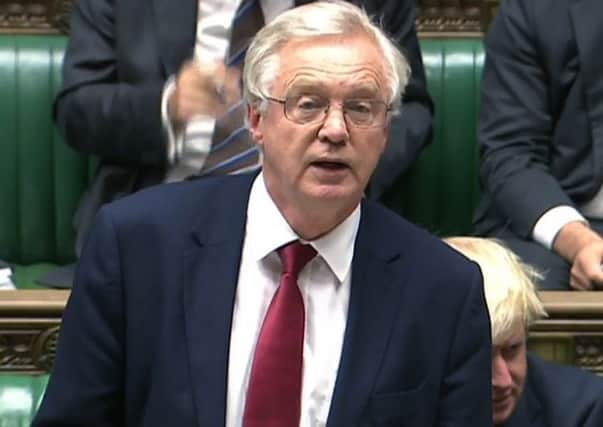SNP accuse Tory government of presiding over '˜dog's Brexit'


Mr Davis held firm on the government’s insistence that there will be no initial parliamentary vote on Article 50, which will trigger the UK’s departure from the EU no later than March next year.
But although he rebuffed cross party calls for MPs to be given a say on the type of relationship the government will seek from the EU, he left the door open to a possible vote after a “final” Brexit treaty has been negotiated.
Advertisement
Hide AdAdvertisement
Hide AdAfter the announcement, Labour accused the government of seeking to “sideline” Parliament, while the SNP accused ministers of presiding over a “dog’s Brexit”.
Prime Minister Theresa May also came under fire from one of her own Brexit-supporting MPs, who accused her of presiding over “tyranny”.
Mr Davis told MPs in the Commons yesterday that the House would be “engaged throughout”, with government sources quoted as saying that a door could be opened to allow MPs a vote on a treaty concluding Brexit, most likely in 2019.
That was not enough to stem criticism from across the political spectrum, with Labour shadow Brexit secretary Sir Keir Starmer demanding a debate and vote in Parliament on the government’s negotiating stance before the two-year withdrawal process is triggered early next year.
He was joined by MPs from all parties who called for Westminster to be given a say on the type of relationship the UK seeks with the EU, with several arguing that the referendum result did not amount to a vote for “hard Brexit” that sees Britain quit the European single market.
Downing Street said that giving Parliament a vote to “second-guess” the referendum decision to leave the European Union “is not an acceptable way forward”.
Conservative MP Stephen Phillips, who backed Leave in the 23 June referendum, accused the government of “tyranny” by denying MPs a vote on the government’s stance in withdrawal negotiations.
And former attorney general Dominic Grieve cautioned that the government could be brought down if it tried to force through a new deal with the EU without MPs’ approval.
Advertisement
Hide AdAdvertisement
Hide AdMr Phillips has been granted permission by Speaker John Bercow to seek MPs’ support for another debate on Brexit negotiations today. In a letter to Mr Bercow, the leading Eurosceptic said that bypassing Parliament was “simply not an acceptable way for the executive to proceed”.
Mr Phillips added: “I and many others did not exercise our vote in the referendum so as to restore the sovereignty of this Parliament only to see what we regarded as the tyranny of the European Union replaced by that of a government that apparently wishes to ignore the views of the House on the most important issue facing the nation.”
Mrs May’s government had “no authority or mandate to adopt a negotiating position without reference to the wishes of the House and those of the British people expressed through their elected representatives”, he said.
Mr Grieve told BBC Radio 4’s World at One: “There’s a very well-established constitutional convention that any signing of a new treaty or alteration of an existing treaty of importance needs to be put to the House of Commons for its affirmative approval.
“My view is that this is a matter where the approval of the House of Commons needs to be sought before the Article 50 process is triggered.”
In a statement to MPs yesterday afternoon on a proposed Great Repeal Bill that will be the legal market for the UK’s exit from the EU within two years of Article 50, Mr Davis said the government would “observe the constitutional and legal precedents”.
He insisted the Prime Minister had prerogative power to start the formal exit process from the EU under existing treaties, without the need for parliamentary approval.
Mr Davis told MPs the referendum vote for Brexit was “clear, overwhelming and inarguable” and that “no-one should seek to find ways to thwart the will of the people”.
Advertisement
Hide AdAdvertisement
Hide AdHowever, he appeared to indicate that the Commons will be offered a vote if the two-year negotiations end with a new treaty with the other 27 EU states, telling MPs: “Naturally I want this House to be engaged throughout, and we will observe the constitutional and legal precedents that apply to any new treaty on a new relationship with the EU. Indeed, my whole approach is about empowering this place.”
Mr Davis said that a Great Repeal Bill to scrap the 1972 Act which took Britain into what was then the European Economic Community would be tabled in the next parliamentary session, which begins in May 2017. The Bill will transpose all relevant EU law into the domestic statute book, so that it can then be amended or repealed by Parliament where necessary.
The SNP’s Europe spokesman Stephen Gethins accused Mr Davis of breaking a Conservative manifesto commitment to stay in the single market, and dismissed the government’s preparations for talks with the EU as a “dog’s Brexit”.
“We may be no clearer on if this is a soft Brexit or a hard Brexit,” Mr Gethins said. “We do know it’s a dog’s Brexit.
“The government’s irresponsible failure to provide any details of their plans are having an impact beyond this place.”
The shadow Brexit secretary demanded a vote before Mrs May invokes Article 50, which she has said she will do before the end of March 2017.
“It seems the Government wants to draw up negotiating terms, negotiate and reach a deal without any parliamentary approval,” said Sir Keir in response to Mr Davis’ statement. “That is not making Parliament sovereign. That is sidelining Parliament.
“That is why Labour is calling for a vote before Article 50 is invoked.”